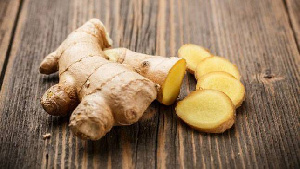Ginger: Effective against nausea, menstrual pain, indigestion and breast cancer

With regards to ginger, you may sometimes come across ground or root ginger. This does not mean the raw ginger root has special medicinal superiority as compared to ground ginger. Let me explain something here for simplicity.
You see, ground ginger contains fewer essential oils and less gingerol than fresh ginger; but more shogaol, which is spicy and pungent. Shogaol is produced as a result of the dehydration process which decreases gingerol and increases levels of the compound shogaol.
Shogaols are believed to have many health benefits and properties that root ginger does exhibit, especially those of memory and cognitive enhancing properties. So dried ginger has the bragging rights to offer benefits from both gingerol and shogaol.
Additionally, ground ginger also contains some different medicinal benefits than raw ginger root. Gingerol is the active component of root ginger that provides many medicinal health properties.
Although often referred to as a ginger root, ginger comes from the rhizome (underground stem) of Zingiber officinale, a tropical flowering plant from the same family as cardamom and turmeric. The sharp bite of raw fresh ginger comes from gingerol, an aromatic compound that transforms into the sweeter zingerone when heated or dried, making ginger an especially versatile ingredient.
Nutrition
As espoused above, ginger is loaded with protective compounds, the notable ones are gingerol, and also:
shogaol
paradol
zingerone
terpenes
polysaccharides
lipids
organic acids
raw fibers
Also, the USDA found that 100 grams (about 3.5 ounces) of raw ginger contains the following:
80 calories
8 grams carbohydrates
8 grams protein
7 grams fat
2 grams dietary fibre
415 milligrams potassium (12 percent Daily Value (D/V)
2 milligrams copper (11 percent DV)
2 milligrams manganese (11 percent DV)
43 milligrams magnesium (11 percent DV)
5 milligrams vitamin C (8 percent DV)
2 milligrams vitamin B6 (8 percent DV)
7 milligrams niacin (4 percent DV)
34 milligrams phosphorus (3 percent DV)
6 milligrams iron (3 percent DV)
Apart from those listed, ginger also contains a small amount of calcium, zinc, pantothenic acid, riboflavin and thiamine. Because most of us eat a very small portion of ginger, the combination with other ingredients in our diet is the surest way to get the needed micronutrient needs. let’s look at the scientific benefits of ginger in a holistic arena.
Ginger – Science
Gingerol
Two studies (Wang et al. 2014; Mashhadi et al. 2013) found that the superior medicinal potential of ginger emanates from gingerol which is potent antioxidant and anti-inflammatory properties.
Ginger fights Nausea, morning sickness
The ginger content in combination with the other effective ingredients in our diet appears to be a sure bet for pregnant women with problems with nausea or morning sickness. One recent study by Anh et al. (2020) found that ginger seems to be extremely effective against nausea. This study reviewed 109 quality clinical trials on ginger’s impact on nausea, and found 43 clinical trials (39.4 percent), demonstrating ‘high quality of evidence’.
Another previous review by Viljoen et al. (2014) of 12 studies used a total of 1,278 pregnant women, and found that 1.1–1.5 grams of ginger can drastically decrease symptoms of nausea. The study further concluded that ginger did not affect vomiting incidents. However, Bode and Dong (2011) in Chapter 7 of the book Herbal Medicine (2nd edition) titled: ‘The Amazing and Mighty Ginger’, reported on trials where a group of sailors who were prone to motion sickness – those who took powdered ginger experienced less vomiting and cold sweats than those who didn’t.
Although it didn’t seem to affect their nausea in this particular study, a related study showed that ginger was found to be as effective as Dramamine for treating nausea and vomiting in pregnancy, along with fewer side effects.
Some studies( Soltan et al. 2018; Mandal et al. 2014; Marx et al. 2017; Crichton et al. 2019; Ryan et al. 2012) found that ginger helps to deal with nausea and vomiting for those going through some types of surgery.
Additionally, it helps deal with chemotherapy-related nausea, though more human studies are required. Studies affirmed that ginger is safe; however, it is required for pregnant women to discuss it with their doctors if they are on it. This notwithstanding, one study agrees that pregnant women nearing labour or those with a previous history of miscarriages to avoid ginger. Lindblad, A (2016) advised that ginger should not be taken by those with a history of vaginal bleeding and clotting disorders.
Ginger and weight management
Both human and animal studies have confirmed that ginger can support weight loss. For instance, one meta-analysis by Maharloue et al.(2019) found that when we take a ginger supplement it can decrease body weight, the waist-hip ratio, and the hip ratio in people with overweight or obesity. Another earlier review by Catherine et al. (2015) found that ginger has the potential to reduce body mass index (BMI) and blood insulin levels.
For the animal studies, I found two studies(Sayeed et al.2020; Kim et al. 2018) that confirmed that rats and mice who took ginger water or ginger extract constantly saw a reduction in their body weight, even in instances where the animals were also fed high-fat diets.
Two studies (Venkatakrishnan et al. 2019; Kim et al. 2018) were able to describe this mechanism of ginger’s ability to influence weight loss: the ability to increase the number of calories burned or reduce inflammation.
Ginger and osteoarthritis
Bartels et al. (2015) literature review notes that there was a drastic reduction in pain and disability in those who used ginger. The strength of ginger found was 500 milligrams (mg) and 1 gram. Another clinical trial by Zahmatkash et al. (2011) found that a combination of topical ginger, mastic, cinnamon, and sesame oil can help reduce pain and stiffness in people with OA of the knee.
Another previous clinical trial by Black et al. (2010) used 2 grams of either raw or heated ginger or a placebo for 11 consecutive days in 40 volunteers. The result demonstrates that daily consumption of raw and heat-treated ginger resulted in moderate-to-large reductions in muscle pain following exercise-induced muscle injury.
Another clinical trial by Altman et al. (2011) in 247 evaluable patients, concluded that a highly purified and standardised ginger extract had a statistically significant effect in reducing symptoms of OA in the knee. This effect was moderate. There was a good safety profile, with mostly mild GI adverse events in the ginger extract group.
Finally, a study by Seo et al. (2021) on mice found that ginger also has anti-obesity effects and has the potential in modulating the development of adipocytes (fat tissue). In this study, after the mice were fed a high-fat diet, ginger supplementation drastically decreased weight gain, hyperglycemia, hypercholesterolemia (high cholesterol), and hepatic steatosis (liver fat) without changing food intake.
Ginger lowers blood sugar level
Emerging studies are confirming ginger’s ability to lower blood sugar levels. For instance, in one study by Khandouzi et al. (2015) which used 41 participants with type 2 diabetes, 2 grams of ginger powder per day lowered fasting blood sugar by 12 percent. Another good news is that ginger also improved haemoglobin A1c (HbA1c), a marker for long-term blood sugar levels. HbA1c was reduced by 10 percent over a period of 12 weeks.
Another recent review by Fang-yan et al. (2019) found that ginger significantly decreased HbA1c in people with type 2 diabetes. The other news is that the study found that ginger did not affect fasting blood sugar. Zhu et al. (2018) also found that ginger can improve lipid profiles and benefit glucose control, insulin sensitivity and glycosylated haemoglobin to protect against the development of type 2 diabetes.
Ginger and cholesterol
Though cholesterol is important to the human body, too much could be detrimental as well. For instance, cholesterol helps in producing bile to manufacture hormones, but when it goes overboard, it can lead to high build-up in the blood, causing blockages and snowballing the risk of heart disease. Studies have found that ginger can naturally decrease cholesterol levels and triglycerides to avert the risk of heart disease.
For instance, one clinical trial by Alizadeh-Navaei et al. (2008) in Iran found that ginger capsule supplementation (3 g/day in 3 divided doses) can drastically decrease bad LDL cholesterol and raise beneficial HDL cholesterol juxtaposed to a placebo.
An animal study by Al-Noory et al. (2013) also found that ginger can be regarded as effective in lowering cholesterol (improving cholesterol markers) as atorvastatin – a pharmaceutical drug normally prescribed for high blood cholesterol.
In all these three studies (Murad et al. 2018; Alizadeh-Navaei et al. 2008; Al-Noory et al. 2013) both human and animal studies saw a decrease in their blood triglycerides.
Ginger and cancer prevention
Due to the compound gingerol, several studies have been conducted on ginger as a potential alternative remedy for cancers. For instance, two studies, (Poltronieri et al. 2014; Kumara et al. 2017) found that the anti-cancer properties are linked to gingerol, which is found in large amounts in raw ginger.
Another form called [6]-gingerol is purported as particularly powerful. For instance, in a Phase II study by Zick et al.(2011) in a 28-day study of individuals at normal risk for colorectal cancer, 2 grams of ginger extract per day drastically decreased pro-inflammatory signaling molecules in the colon. However, Zick et al. (2015) follow-up pilot study on humans at high risk for colorectal cancer found different findings. This notwithstanding, two pieces of evidence (Akimoto et a. 2011; Prasad et al. 2015), though limited, found that ginger can be effective against other gastrointestinal cancers such as pancreatic cancer and liver cancer. Finally, two studies have demonstrated that ginger can be effective against breast cancer and ovarian cancer (Martin et al. 2017; Pashaei-Asl et al. 2017).
Ginger and brain function, against Alzheimer’s disease
Studies have found ginger’s ability to support brain function and cognitive health (Zeng et al. 2012). For instance, Saenghong et al. (2012) found ginger extracts to support attention in middle-aged women. I also found three studies (Wattanathorn et al. 2011; Oboh et al. 2012; Zeng et al. 2013) in animals that ginger has the potential to protect against age-related decline in brain function.
Ginger and infections
Apart from being regarded as antifungal properties, ginger also has the bragging rights to avert bacterial infections, such as urinary tract infections, pneumonia and bronchitis. This is done as a result of the compound gingerol. For instance, Park et al. (2008) found that the compounds gingerol help inhibit the growth of some strains of bacteria that cause gum disease.
Another test-tube study by Karuppiah and Rajaram (2012) also found that ginger extract was effective against so many drug-resistant bacteria. Aghazadeh et al. (2016) test-tube study found the ginger extract to be effective against two types of yeast that normally trigger fungal infections in the mouth, while Ficker et al. (2003) test-tube study examined the antifungal effects of 29 plant species and found that ginger tops as the most effective at killing off fungus. Finally, Chang et al.(2013) study also found that fresh ginger can be effective against the respiratory syncytial virus (RSV) – a common cause of respiratory infections.
Ginger and menstrual pains
Studies have found that one of the significant health benefits of ginger is to deal with pain, including menstrual pain. This was demonstrated in one clinical study by Ozgoli et al. (2009) where 150 women consumed either ginger or a non-steroidal anti-inflammatory drug (NSAID) for the first 3 days of their menstrual period.
The three groups received four daily doses of either ginger powder (250 mg), mefenamic acid (250 mg), or ibuprofen (400 mg). The study found that ginger was able to reduce pain as effectively as the two NSAIDs (pharmaceutical drugs).
I also found two recent studies (Rad et al. 2018; Chen et al. 2016) that agreed that ginger is more effective than a placebo, and similarly as effective as drugs such as mefenamic acid and acetaminophen/caffeine/ibuprofen (Novafen). These are enterprising studies and more superior quality studies with more numbers of study participants are still needed.
Ginger and chronic indigestion
More studies have also been conducted and supported ginger in supporting digestive health. The studies also found ginger to have the ability to avert challenges such as dyspepsia, a common condition of impaired digestion characterised by symptoms like pain, heartburn, fullness and discomfort.
On the other hand, chronic indigestion is characterised by recurrent pain and discomfort in the upper part of the stomach and studies have found that ginger can deal with such issues. What is also available is that when one delays emptying the stomach, indigestion is the end product. This notwithstanding, a recent study by Bodagh et al. (2019) found that ginger aids in clearing the stomach. The dosage of ginger used in this study indicates that a divided lower daily dosage of 1500 mg of ginger is beneficial.
Another earlier study by Hu et al. (2011) found that those with functional dyspepsia, meaning indigestion with no origin, were made to consume either ginger capsules or a placebo in a small 2011 study. After one hour, they were made to take some soup. The study noticed a time frame of 12.3 minutes for the stomach to empty in people who received ginger. It took 16.1 minutes for those who received the placebo.
Similarly, Wu et al. (2008) found similar effects in people without indigestion. In this study, 24 healthy volunteers consumed ginger capsules or a placebo. They were all given soup an hour later. They found that eating ginger as against the placebo drastically fast-tracked clearing of the stomach. For instance, it took 13.1 minutes for those who consumed ginger and 26.7 minutes for those who received the placebo.
CLICK HERE TO DOWNLOAD PRESS RADIO MOBILE APP

In summary, adding ginger to your diet gives you all these health benefits as it is loaded with nutrients and bioactive compounds that have powerful benefits for your body and brain. It’s one of the very few superfoods worthy of that term.
Source: thebftonline.com






